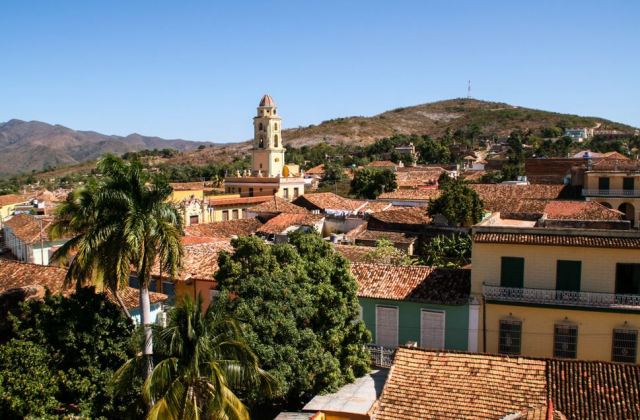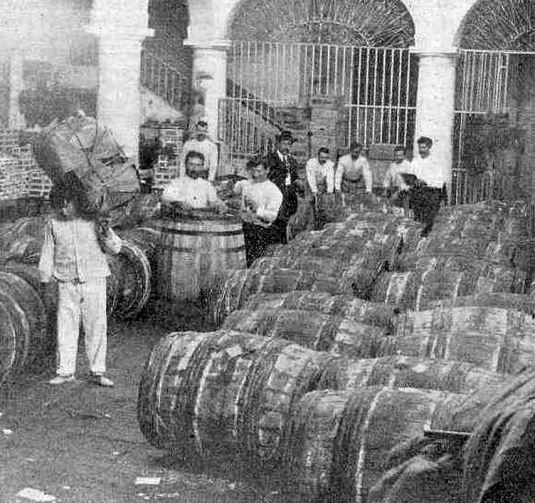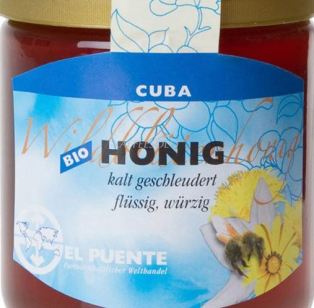
A beekeeper’s paradise?
Long before the embargo and before the Castro brothers, Cuba was a beekeeper’s paradise North American gringos operating Cuban honey farms. Spain ruled Cuba for almost 400 years, but the United States took it as a trophy after the Spanish-American War (1898). The USA quickly granted Cuba independence (1902), but claimed the right to control Cuba’s foreign affairs and its finances. For the next 50 years, Americans built businesses on the island. The biggest money makers were rum, casinos, and resorts, but beekeepers also set up shop. Cuban honey farms owned by beekeepers in New York and the US midwest were once a big thing.

American-owned honey warehouse in Havana in 1902.
(from American Beekeeper, May 1902 issue)
Well, it may happen again. Not that Cuba’s beekeepers are suffering. Last year, they produced 15 million pounds of honey. Not only that, but at $23 million, honey was Cuba’s 4th most valuable export crops in 2015, passing both sugar cane and coffee!

Cuban organic honey from Campilla blanca. Trade Fair label and priced at about $8/pound. Here’s a link to the German vendor.
Cuba may have a special edge in honey markets. According to an article in The Guardian, Cuba is the world leader in organic honey production. As the newspaper sees it, the absence of pesticide makers (such as Bayer and Monsanto) has left Cuban farmers without poisons and GMOs, resulting in pristine pastures for honey bees. I’m not so sure.
Perhaps there are some isolated areas in Cuba which don’t receive pesticides, herbicides, or other farm chemicals. But it’s likely Cuban farmers use locally produced and sometimes harsher chemicals from the old DDT days – things like arsenic, cyanide, and the ‘thion series. According to International Bee Research science director Norman Carreck, in Cuba “the overall use of pesticides has been fairly controlled,” putting a damper on The Guardian’s implication that Cuba is entirely pesticide-free. It is not. The Guardian also suggests that Cuba, as a home to organic foods, has healthier bees. Perhaps, but it’s also possible that the embargo has stopped bee imports and their attached varroa partners. Being economically isolated can have ecological advantages.
What will happen when Cuba can finally import stuff from the USA again and beekeepers build new honey empires on the island? With the Pope and perhaps the president visiting, American beekeepers are sure to follow. Undoubtedly, Cubans will replace donkey carts with pickup trucks and they’ll have finer toys and stuff. Life, I hope, will improve for ordinary folks. People will be free to criticize their government and subscribe to the Guardian and New Yorker, and freely post their opines to the web. But with open borders, things like pests, modern pesticides, and increased bee mortality may also arrive. It will be interesting to see how this unfolds.

Are we sure they don’t have mites in Cuba? It seems to me a short distance for a determined bee to fly, even with a mite on its back.
LikeLike
The Florida Keys are 140 km north, so bees would not bring the mite driectly from there. However, varroa arrived in Cuba in 1996, probably from well-meaning Venezuelan beekeepers, but possibly not carrying the viruses known to vector through varroa. This may have prevented CCD on the island. Varroa seems largely confined to a few areas. It would be interesting to see if the bees have adapted to them elsewhere in the country, assuming there is little access to miticides.
LikeLike
Thank you. I don’t know why I thought Cuba was closer to Florida. I need to brush up on my geography. I wouldn’t be surprised if they adapted to mites there since many beekeepers here are successfully keeping bees without miticides.
LikeLiked by 1 person
It’s more likely that the bees in Cuba are not collapsing because the farmers are not using systemic pesticides like Neonicotinoids.
LikeLike
Hi Bill,
Thanks, you may be right. On the other hand, I live and beekeep in Alberta, Canada, where neonics have been used for a decade to control flea beetles on canola – Alberta has never had colony collapse. Similar story in Australia. Other places (such as lower mainland BC) have almost no neonic use, yet have had severe CCD. Wish I understood this. Not questioning that pesticides are poisons and that certainly includes neonicotinoids. Drench bees in any of these and they die. What do you think? Have you had CCD in Illinois?
Ron
LikeLike
Interesting blog. It’s Norman Carreck who is the director of IBRA not Frank
LikeLike
Thanks! I’ve corrected it. Here’s a link to Mr Carreck’s profile at the University of Sussex. I’d like to say that I put little errors into my posts to see if anyone is reading them, but that would be highly disingenuous. Thanks for catching this.
LikeLiked by 2 people
Extremely interesting. Salute to development of Cuba
LikeLike
Dear Ron, Can you recommend some beekeepers to visit in Cuba? We are a family of beekeepers (and I am a beekeeping instructor) interested in seeing just how healthy the bees are in Cuba with mites and minimal pesticides. Although, they don’t have our winters to deal with! I hope your bees have overwintered!
LikeLike
Hi! I haven’t been to Cuba but perhaps some of our readers can make recommendations on meeting beekeepers there. If you have any ideas, please add them by replying here. – Ron
LikeLike
who said there is not pesticide or herbicide in Cuba? Cuba was drowned with chemicals from the 70-90s you just believed them.
LikeLike
You ask, “Who said there is not pesticide or herbicide in Cuba?” I didn’t say that. You would not ask such a stupid question if you had actually read this piece. The answer: No one said that there are no pesticides or herbicides in Cuba! Good God! Please read before attacking. The post says that Cuba is the world’s largest exporter of organic honey. It does not say that Cuba is chemical-free. The source cited, The Guardian, quotes Theodor Friedrich, the UN Food and Agriculture (FAO) representative for Cuba. He’s an agriculture specialist working for the UN and he says that Cuba exports more organic honey than any other country.
Since you, Leonardo, did not bother to read this piece before telling me that I “just believed them”, let me repeat what I wrote:
No, my ignorant friend, I did not “just believed them” but instead I did the exact opposite – I questioned what was written and tried to understand the Guardian report by researching other sources. Do you know what happens to spammers like you who don’t read posts but then attack the writer? They stay stupid.
LikeLike